Well, here we are once again, friends. The culmination of a year’s writing about Our Thing always brings about a mixture of reflection, relief, and exhaustion, but above all else we’re feeling excited. Excited by the musical future which our favourite records of 2017 seems to portend. Genre snobbery holds less and less influence, allowing for promising new hybrids and advancements, and artists are responding to horror and uncertainty in the broader world with forceful and considered musical statements. We hope that your experience within and without the field of Our Thing has brought you into contact with some new favourites, and reconnected you with some artists you already knew. Without further ado, our Top Five records of 2017.

5. Drab Majesty
The Demonstration
Dais
The hook behind Drab Majesty – Andrew Clinco taking on the persona of reclusive grande dame Deb DeMure in order to better evoke the dreamy nostalgia of the band’s music – was fun and quirky enough when its early singles began appearing five years back. But sophomore LP The Demonstration need not worry about ornamentation, and the concept often fades from mind while the tunes are playing, and what tunes they are. The new wave-cum-dream pop songwriting chops the record, um, demonstrates, put Drab Majesty in a class all their own this year. There’s nothing especially flashy about the echo pedals and soft keyboard pads which do much of the heavy lifting here, but they’re used to create tunes of such impact and clarity that the focused instrumentation of the LP seems to be as much about pop economy as atmosphere. Not that The Demonstration wants for the latter. From the lithe “Too Soon To Tell” to the reverberating arpeggios of “39 By Design” (which actually doesn’t suffer for its proximity to Disintegration, a comparison we don’t make lightly), Clinco is able to conjure the insular and morose world DeMure inhabits with apparent ease. That a record so ostensibly dreary feels light and approachable is a whole other achievement unto itself. Alive with death and deftly cumberson, The Demonstration embraces the contradiction inherent to the idea of “goth pop” and works as a masterstroke under either rubric. Read our full review.
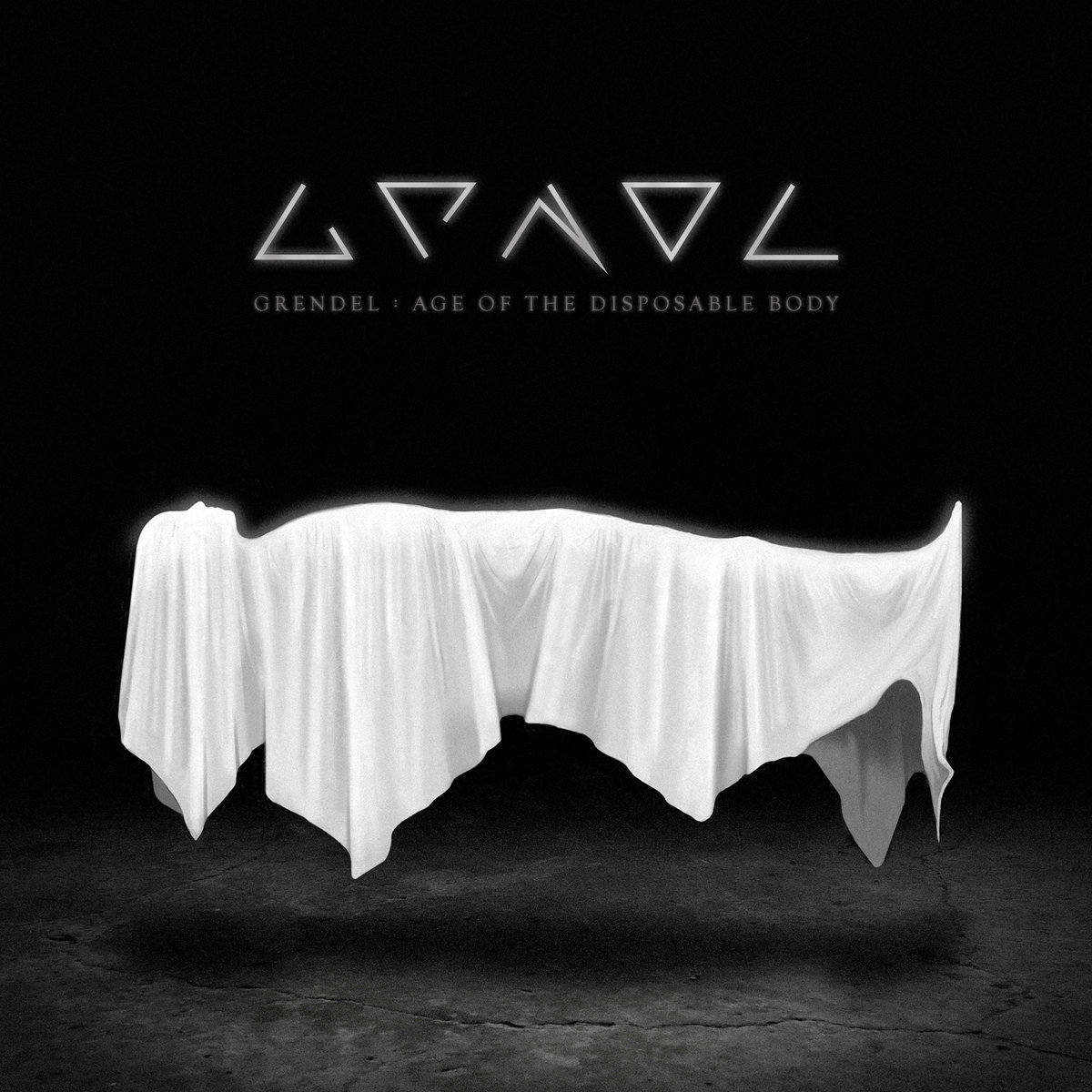
4. Grendel
Age of the Disposable Body
Infacted Recordings/Metropolis Records
Age of the Disposable Body is the culmination of the creative arc JD Tucker has been on for the better part of the decade now. Ten years removed from the band’s final word on aggrotech, Harsh Generation, Tucker has reinvented Grendel as a sleek, modern electro-industrial project, able to reference both classic genre tropes and introduce brand new ideas with equal aplomb. The stylistic design of the record really is something, as Tucker digs deep into percussive, tightly sequenced basslines that recollect Caustic Grip-era Front Line Assembly, using them to drive big melodic hooks ornamented by complex arrangements of synths, orchestra and choral sounds, and even saxophone in the case of “Severed Nations”. It’s a remarkably versatile modus operandi, and Tucker makes good use of it to create uptempo bangers like “Hex It” and “Scorn”, mid-tempo groovers like “Flux”, and even an affecting and ballad in the form of the title track, where his own unshrouded voice delivers a genuine moment of raw emotion. That it should feel like the band’s most personal record is appropriate, as it’s unambiguously the product of life in the pressure cooker of modern day UK politics, and unflinchingly addresses the uncomfortable truths at the root of Brexit and the uncertainty it portends. Grendel has always been pre-occupied with the idea of dystopic futures and their human cost, and with it becoming increasingly clear that some of our worst fears have come to pass and the possibility that the end may in fact be extremely fucking nigh, JD Tucker has risen up to offer his definitive statement. Age of The Disposable Body is the sound of right now. Read our conversation about it.

3. Wulfband
Revolter
Progress Productions
On one level we knew what to expect from Wulfband this time. We were veterans of their frenetic EBM blitzes; we’d been made privy to just how manic they could render a genre ostensibly rooted in the immediacy of bodily instantiation but often relegated to nostalgia. Their self-titled debut brought danger and excitement back to a stripped-down template of basslines and drums which had grown overly familiar. What we hadn’t counted on was just how much more those Swedische Muttifickers would be able to bring to bear on their second salvo. Revoleter is a record beset by horror vacui; constantly looking at their own structure and finding themselves wanting, Wulfband are perpetually puncturing holes in their own tracks in order to add drum fills, pick slides, samples, time changes, flat-out anything in order to avoid ever be accused of standing still for a single moment. There’s a catch in the mean BPM of the record; rather than speeding above and beyond a comfy 120 BPM in an attempt to accelerate their agenda, Wulfband take the opportunities afforded by a slightly slower tempo to constantly whiplash the listener 90 degrees in whichever particular direction their fancy strikes them: one measure you’ll be thrashing along to a classic EBM punisher before being pulled off into a floor-punching hardcore breakdown a la “Kpt Kaboom”, at another you’ll be sent careening into an unparseable flurry of pitched-up klaxons which just don’t make sense even as Wulfband insist that “Ja, das ist musik”. You’ll just have to take their word for it and pray that you can survive the most hyperkinetic barrage of body music we’ve survived in recent memory. Read our full review.
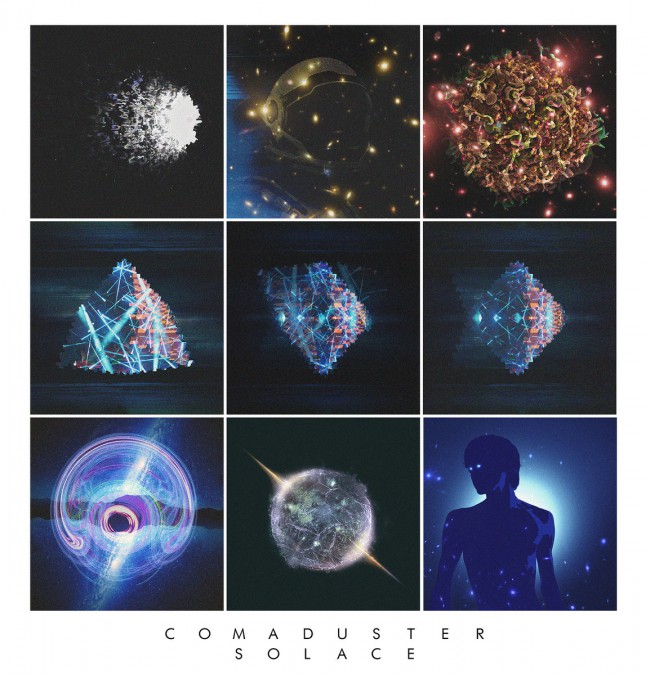
2. Comaduster
Solace
self-released
Our expectations for Solace were primed for several years before its release. Not just by keeping tabs on how Réal Cardinal was working to bring a wider range of his talents and interests both as a composer and sound designer to the already vast scope of Hollow Worlds, but also the sheer ambitiousness of the concept underlying the follow-up he was crafting. The science-fictional story of Solace and its connection to very real-world issues of mental and emotional health are too complex to summarize here (check out our recent interview with Cardinal for more details), but even with all of that preparation the sheer power of Solace took us absolutely by storm. The sorts of bass music and IDM from which Cardinal drew inspiration for Solace are often viewed as being complex to the point of total abstraction, but the melodies and harmonies Cardinal weaves overtop of stacks of polyrhythm are clarion calls which ring clear and beautiful. With some months’ distance from our initial shock at Solace‘s impact, that balance of complexity and simplicity is as good a means for reading and understanding the record as any. Yes, the worlds and beings Cardinal imagines are wholly alien, but the forces which guide them – loneliness, the sense of home, memory and forgetting – are wholly familiar. The details of the tracks, their modulations and microedits, are fractally granular, but their composite spirit, feeling, and phrasing are instantaneously memorable and affecting. And that might in fact be the magic alchemy that makes the record such an accomplishment: it’s an LP of production so state of the art it actively sounds like the future, but also an LP where that audio wizardry is intractable from its narrative, themes, ideas, and emotions. The gravitational pull of the bass ripples and syncopated drums on “Shadowsphere”, the vast stereo field of “Emergent One” with Cardinal’s voice it’s sole inhabitant, the way the album ends at the exact moment it begins, all evidence of its fusion of song and studiocraft. We’d say it’s unparalleled in its field, but the truth is that it’s in a galaxy of its own. Read our full review.
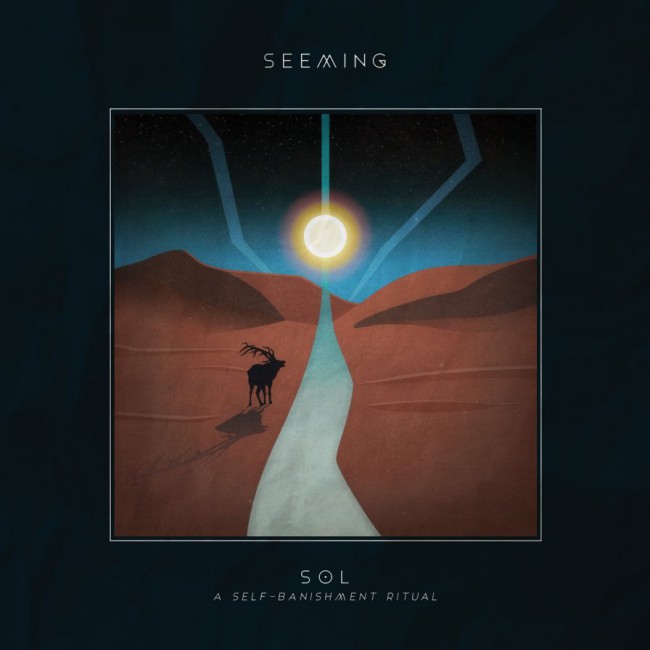
1. Seeming
SOL: A Self-Banishment Ritual
Artoffact Records
Seeming doesn’t just explode genre barriers, it’s a project which makes you think about how it is we group, classify, and organize music, and perhaps above all why we do those things. On the second Seeming record Alex Reed has found a way to harmonize his catholic appreciation for music well beyond goth-industrial niches, the post-apocalyptic ruminations which made Madness & Extinction such a striking piece of work, and a fervent desire to do better, to move forward, to find paths for survival and hope in the post-industrial world, in both senses of that term. Because of this, it’s impossible to separate the integration of funk, disco, and R&B into Reed’s “post-gothic” ethos from the overarching theme of SOL, as indicated by its subtitle: the immolation of the post-industrial subject as it’s been ordered economically, socially, psychologically, racially, sexually, and even genetically.
There’s been plenty of music in the industrial milieu which has embraced the techno-apocalyptic as the logical conclusion of history but that’s also revelled in the finality of “The End” as a totalizing and transcendent signifier. Reed takes no such shortcuts or easy ways out. It’s preoccupied with the idea of the abandonment of the self as a guiding principle, but also how that kind of literal and personal armageddon isn’t actually final, and how we might move forward from it. Even as “Phantom Limb” outlines the concept of absence in terms of the individual, the astonishing “I Love You Citizen” reinterprets them in macro, revelling in the intimacy of solitude. Reed’s preoccupation with the power and permanence of the natural world takes centerstage on the shadowy “The Wildwood”, either literally or metaphorically a forest where a post-everything subject might find themselves depending on how you choose to interpret it. These are big ideas, but they’re delivered so evenly, so adroitly via these songs that you find them inhabiting your thoughts even when you aren’t actively listening to the album. Charming duet with Sammus “Stranger” is a damnably fun pop song, but its not so hidden agenda becomes a kind of mantra: in an actively hostile world, the solution isn’t to contort to fit in, but to do the exact opposite.
How to even describe the record is a problem we’ve struggled with in discussing it, especially in how it eschews easy categorization. That post-gothic tag is in sharp focus on SOL: it’s specifically the kind of record that exists because of what has already happened in Our Thing. The question it asks lyrically, thematically, and musically is that once we know where we’ve been, how do we move forward? It’s not goth or industrial or synthpop or any of the other myriad genres we write about on I Die: You Die. It’s Seeming, and it’s unquestionably of Our Thing: even as it forges a path it leaves it behind to run with wolves through a blasted and beautiful wilderness. Read our full review.
That’s a wrap! We’ll be posting a podcast tomorrow (and one a week until the end of the year) and be returning in 2018 with more reviews, interviews, conversations and observations about the vast world of Our Thing.




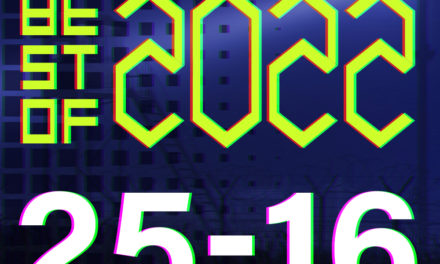

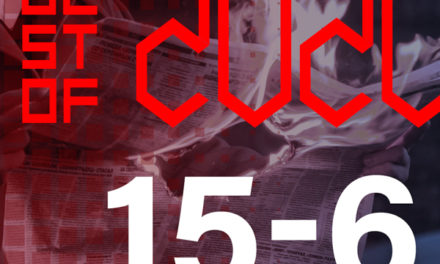
I think my trouble with SOL is that I just don’t find it as remarkable or enjoyable as Madness & Extinction, which was nothing short of a masterpiece. There are a handful of good songs on it (primarily “The Wildwood” and “Stranger”), but the album doesn’t have a “The Burial” or “Goodnight London,” songs I could listen to over and over again and never grow tired of them. Thematically, it doesn’t hold together as well as the first album either, or perhaps I’m just not as enamored with SOL’s theme of isolation as I am with the end-of-the-world pathos he’s channeling on Madness & Extinction. All that said, I appreciate the thoughtfulness and musicality that Reed brings to his releases, and I’m all for “exploding genres.” He’s really only competing with himself in my opinion.
Great list as always. Some records I keep returning back to and like to recommend from 2017 are:
Black Line – Treason, Sedition, and Subversive Activities (A record that is easy to like for many resons.)
S.K.E.T. – Continuing Crisis (Have Power Noise ever sounded this well produced before?)
Dive – Underneath (Still going strong. Still being contemporary.)
Marcus Fjellström – Skelektikon (Marcus sadly passed away this year. This is truly a beautiful album.)
Trepaneringsritualen – Kainskult (A rather easy listening records from Thomas. Sounds like early Cold Meat Industry stuff.)
Agrezzior – Strike Back (fine swebm.)
Blanck Mass – World Eater (A very eclectic record.)
Corbin – Mourn (Not for everyone i guess, but a interesting mix of alternative R&B with a hint of vulnerable, dark electronica.)
I think Blanck Mass, Corbin and maybe Arca might be the new undercurrent thingie that I spotted this year. They come from diffrent backgrounds, but somehow have an appeal to people who are into darker alternatives. They certainly push things forward.
Nice list you have here, containing a number of my personal favorite albums of the year too. By the way, did you notice the similarities between the Blanck Mass and the S.K.E.T album? The latter album also being great but, in my opinion just a tad long. The Marcus Fjellström (RIP), was indeed great too.
Now that you mention it, that’s probably the case. I have not thought of it before. Do you have any recommendations in addition to what has already been mentioned on this site?
Oh yeah, loads of great music out again this year. Particularly a lot of interesting staff which could be very well considered industrial but done by artists mostly outside it. I’m thinking of releases such as;
Jasss – Weightless / Pan Daijing – Lack. / Constantine – Hades / City – A Goal is an Image / Ben Frost – The Centre Cannot Hold / Black Mecha – I.M Mentalizing / Emptyset – Borders / die ANGEL – Entropien I.
In a similar vain of interesting things being done from the outside, very great releases by artists doing some really great and interesting things with EBM (sadly neglected on these pages), I’d very strongly recommend; Phase Fatale – Redeemer / Novo Line -Dyad / Not Waving – Good Luck / Powell – New Beta Vol. 1, 2, 3. / V/Vm – Brabant Schrobbelèr / Ninos Du Brazil – Vida Eterna.
Then there where some remarkable noise/power electronic. Some of my personal favourites where: Dave Phillips – Rise / Am Not – The Developing World / She Spread Sorrow – Mine / Aaron Dilloway – The Gag File / Joachim Nordwall – The Ideal Black / Sewer Election –
Malign / Vanity Productions – Only the Grains of Love Remain / Kontinent -Stasis / Kevlar – New Fear New Fights.
And then there where some truly great genre-less gemes; Rabit – Les Fleurs Du Mal / Chino Amobi – Paradiso / The Caretaker – Everywhere At The End Of Time – Stage 3 / Jasmine Guffond – Traced / Mattias Gustafsson – Nattmusik / ‘V-Á – Antologia de Música Atípica Portuguesa / Akira Rabelais / Spellewauerynsherde / Andrew Hargreaves – Pose Plastique / Alessandro Cortini – AVANTI / Hvide Sejl, Varg & F. Valentin – Brazil.
Ok, I best stop now, otherwise I’ll go on forever. But, given you list above I’m sure you’ll like a fair bit of these album if you don’t know them already. Will be keen to hear your thoughts on any of them and equally keen to hear some recommendation from you.
Geez, forgot Drab Majesty – what a long fucking year!
Your list mirrors much of what I’ve been listening to this year (well in our thing anyway). While I thought Comaduster would win (sorry Real, 2nd again) I agree with Seeming as #1 – nothing else sounds like Alex’s work anywhere and it all became that much bolder and more breathtaking.
It’s funny that you mention Encephalon’s latest as an electro-industrial “opera”; aside from differing genres, don’t we all get the same feel from Seeming’s work? My son’s studying acting and fronts an indie band in the Brampton/Toronto area and I could see him “performing” a song such as ‘Doomsayer’ or ‘Talk About Bones’ on a theatrical stage. If, somehow, that sounds somehow backhanded to some, it certainly wasn’t my intention.
For what it’s worth, I would’ve included Venus in Aries and Eye Steal (TV Armour was one of my favourite songs of 2017) but I can’t fault any of the entries here.
Cheers Alex and Bruce for the work that you do.
I have no issues taking the #2 spot once again at all 🙂 Both of my album releases were put out in years with soooo many excellent records. The quality of releases this year is astounding, and TBH I’m happy to be included in any of the year end lists. Making a list for the best of all of the music I’ve listening to in 2017 would take me all of 2018 (I’m still playing catch up!). So I commend Bruce and Alex for taking this on once again, and still managing to keep a succinct and honest perspective on it all.
Cheers!
Thanks, guys. Cool list. Some of my faves are further down (m.i.a.b., Boy Harsher, Multiple Man) or missed the cut (Forces! Horskh!). Lots of great stuff again this year. I’ll have to go back and check out some of the ones I missed the first time around, like Grendel.
Horskh! That album is for sure on my 2017 list. So good. Forces is awesome, too.
Disappointed that 2nd Face’s incredible Nemesis didn’t make the list.
Or Cyanotic’s Tech Noir.
I would have included these:
Faderhead – Night Physics
Shiv-R – Requiem For The Hyperreal
SITD – Trauma Ritual
X Marks The Pedwalk – Secrets
Seriously? No Horskh or Fix8:Sed8? I’m stunned.
Idie:you die. Your source for music that has already been created 20 years ago.
I believe if you look closely you will find that all of these releases are actually from this year and not 1997
You: Suggests Fix8, one of the most retro sounding bands in our thing.
Also you: Complains that all the albums on the list sound 20 years old.
Where are the bands that have that new industrial sound ????
Here are some of my personal favourite albums of the year. Naturally disappointed, though understanding, that none of these got even a mentioned on the site. I’m particularly surprised that there was no reference whatsoever to either City or Croww, both of which hail from Canada with the former residing in Vancouver. If either of you are not familiar with City’s “A Goal is an Image”, I cant recommend this album strongly enough.
City – A Goal is an Image
Belief Defect – Decadent Yet Depraved
Chino Amobi – Paradiso
Dave Phillips – Rise
Am Not – The Developing World
Joshua Sabin – Terminus Drift
Trepaneringsritualen – Kainskult
Jasss – Weightless
Pan Daijing – Lack
Constantine – Hades
Jasmine Guffond – Traced
Emptyset – Borders
Siavash Animi – TAR
AnD – Social Decay
Ben Frost – The Centre Cannot Hold
She Spread Sorrow – Mine
Croww – Prosthetics
Rafael Anton Irisarri – The Shameless Years
Phase Fatale – Redeemer
Novo Line -Dyad
Ninos Du Brazil – Vida Eterna.
Abul Mogard / Maurizio Bianchi – Nervous Hydra / All This Has Passed Forever
Rabit – Les Fleurs Du Mal
Black Mecha – I.M. Mentalizing
Alessandro Cortini – Avanti
Lawrence English – Cruel Optimism
Uncodified – Hyperinflation
Blanck Mass – World Eater
A Year in the County – Undercurrents
Stairway Maze – Hollow Spaces / Aries
Richard Skelton – Towards a Frontier
Time Attendant – Ruby Modifier
That Richard Skelton album was amazing. If you liked that, you should check out his The Inward Circles – And Right Lines Limit And Close All Bodies. Super good album.
Have to wait until after the holiday season, his bandcamp has a way of bankrupting a person. I just got JASSS’ debut and wish I’d had it sooner, she’s insanely talented.
Yeah that album is super amazing and seems to just get better and better with every listen. I must say that I find it really surprising that not more “industrial” people have payed attention to this album. Another one I think you might like is the Belief Defect. After the holidays 🙂
Right, I’m over budget now and happily so. Genius work! Goes perfectly with this:
https://rotorbaberecordings.bandcamp.com/album/keepers-of-the-divine-bomb
Great, I’ll certainly check that out. BTW, thanks for mentioning A Year in the County – Undercurrents. I had a brief listen to that and really enjoyed it, I’ll have to get that at some point, thanks.
Hello guys!
Thank you for this year’s review, as usual it’s been a pleasure to listen and to read though it. With a little delay, mainly because of health issues, I finally managed to put together my own version of your review in my Mixcloud profile, hoping that you like it. It is kind of a way of paying back for all your efforts in providing us with new music during the whole year. I hope you enjoy it! https://www.mixcloud.com/soulmanager/i-die-you-die-best-of-2017-top-25/
Thanks a million Gustavo! These are always very appreciated, will post on our FB and Twitter!
Electraumatisme top 10 of 2017 :
01 – Statiqbloom – Blue Moon Blood
02 – Fix8Sed8 – Foren6
03 – Void Kampf – Funk Off
04 – Wulfband – Revolter
05 – Pyrroline – In the Dawn of Freedom
06 – Chrome Corpse – S/T
07 – Azar Swan – Savage Exile
08 – Die Selektion – Deine Stimme Ist Der Ursprung Jeglicher Gewalt
09 – The Psychic Force – Welcome to Scarcity
10 – 2nd Face – Nemesis
For french speakers, you can listen to the corresponding podcast here :
http://electraumatisme.blogspot.com/2018/01/playlist-electraumatisme-du-03112018.html